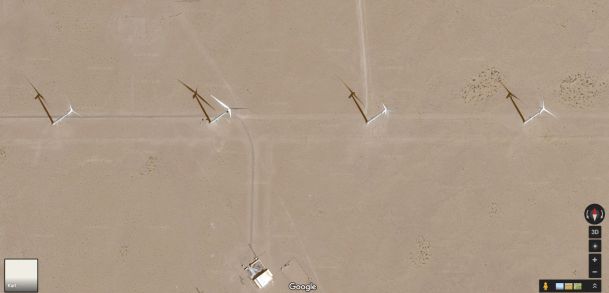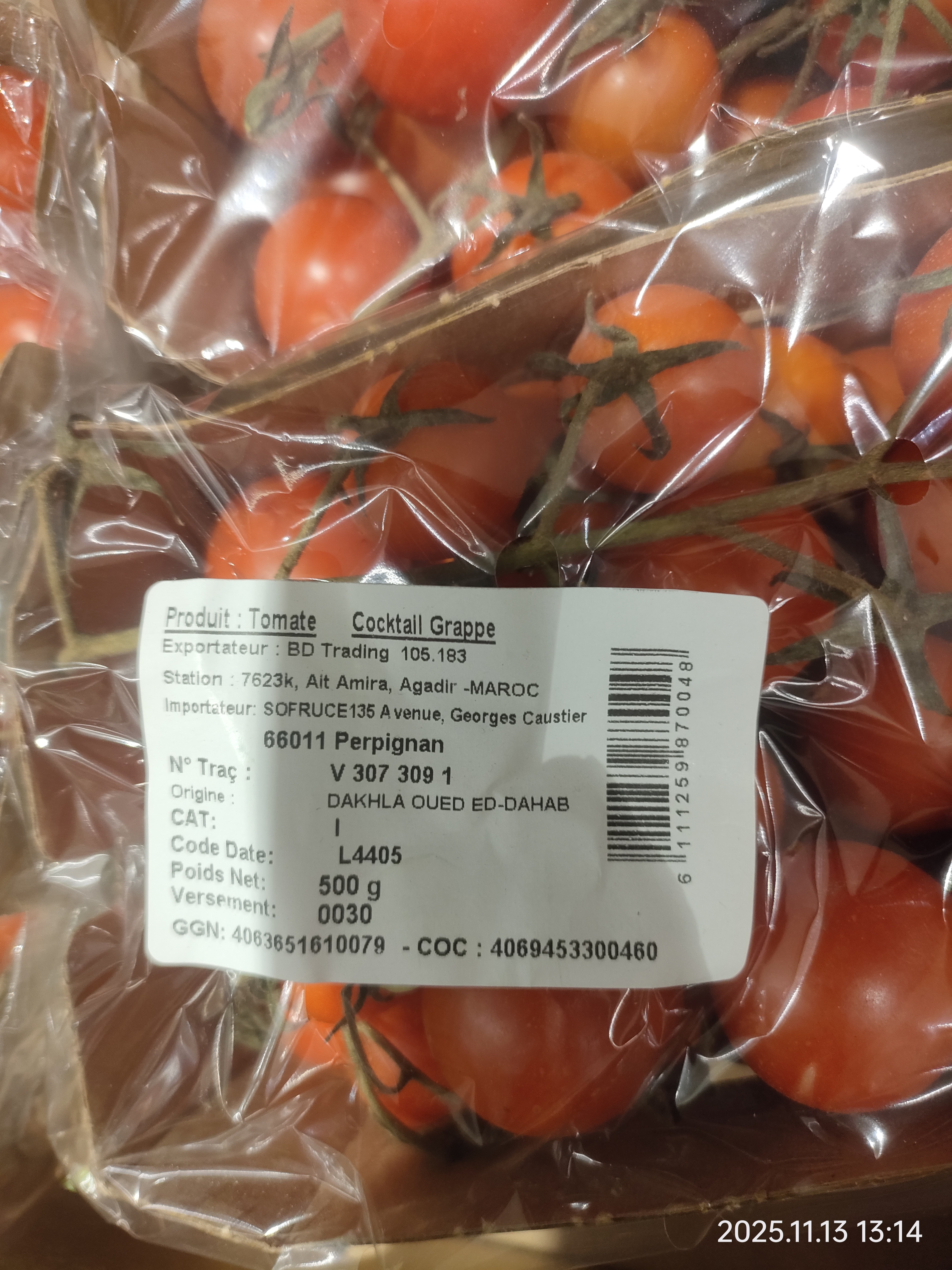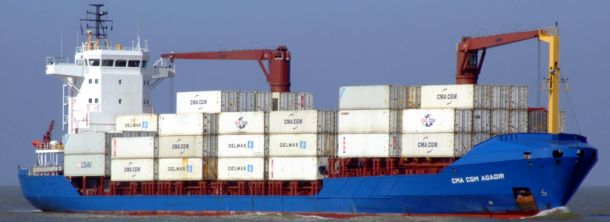
Three months after French company Engie condemned Russia's invasion of Ukraine, the company inks deals to start building a large water project in Western Sahara, in partnership with the government of the illegal occupier Morocco.
Photo: ‘Les Domaines Agricoles’ (ex-Domaines Royaux) is the largest agribusiness firm in Morocco, and belongs to the holding of the Moroccan king. Depicted here is its plantation near Dakhla, occupied Western Sahara, which will be one of the beneficiaries of Engie's desalination project in the occupied territory. Photo @ellilorz.
On 22 June 2022, French multinational utility company Engie signed several public-private partnership (PPP) agreements and a Memorandum of Understanding with the Moroccan government, effectuating the company’s desalination project in Dakhla, a town located mid-coast occupied Western Sahara.
In the presence of Moroccan prime Minister Aziz Akhannouch, deals were signed between the Moroccan ministries for agriculture, fisheries, rural development, waterways and forests, Morocco’s national agency for electricity and drinkable water ONEE and the 50/50 joint-venture Dawec (“Dakhla Water & Energy Company”) owned by Engie and the Moroccan king’s energy company Nareva.
The Moroccan newspaper Le Desk has published a group picture of the French company together with the Moroccan officials on the occasion of signing deals for projects in the occupied territory. It is only three months since Engie condemned Russia's invasion of Ukraine.
The project envisioned by Engie is located in a land over which the Moroccan government holds no legal title. Dakhla is located in the part of Western Sahara that was illegally invaded by Morocco in 1975. While Morocco continues to militarily occupy two-thirds of Western Sahara, its claim to sovereignty over the territory was rejected by the International Court of Justice, and in recent years also by the EU Court of Justice. The United Nations consider Western Sahara as a Non-Self-Governing Territory without an administering power in place. When Morocco expanded its occupation to the Dakhla peninsula in 1979 the UN General Assembly urged Morocco to withdraw its occupation from Western Sahara.
Engie has been contracted by the Moroccan government to build a wind-powered desalination station at about 75km outside of Dakhla. The station’s main purpose is to advance the Moroccan government’s plans of transforming another 5,000 hectares of land into plantations and greenhouses. Today, agricultural activity in the Dakhla area is characterised by export-oriented industrial farms that are owned by Moroccan businessmen or the Moroccan monarchy, specialising in tomatoes and melons that are shipped to the EU. The EU-Morocco trade deal which purports to organise this particular export from occupied Western Sahara, has been invalidated by the EU Court of Justice in 2015, 2016 and again in September 2021. The Court argued that since Western Sahara is separate and distinct from any country in the world, including Morocco, and that the latter has no sovereignty or administering mandate over the territory. As such, an agreement between the EU and Morocco cannot be applied to the territory, unless with the explicit consent of the people of the territory, expressed through their UN-recognised representation the Polisario Front.
Morocco however is keen to expand the highly politicised agricultural activity in the area, which in size is modest in comparison to agriculture in Morocco proper. But the main purpose of farming in Dakhla is not of an economical nature, but rather the political kind, meant to elicit implied support for Morocco’s untenable claim to the territory it holds under brutal occupation.
In response to questions by WSRW, Engie has referred to “two legal analyses [that] have been given by major law firms; a social and environmental impact study has been carried out, as well as the consultation of local communities”. Yet the company will not make any of these documents available for public scrutiny, or – more importantly – for assessment by the people with the sovereign rights to Western Sahara: the Saharawis.
Engie in 2021 contracted the company Global Diligence to carry out an alleged “consultation” of stakeholders locally on the occupied territory. Questions asked by WSRW to Global Diligence remain unanswered. Ironically, Global Diligence has in parallel worked on the human rights violations committed in occupied parts of Ukraine.
Work on Engie’s planned desalination station is expected to commence soon. The desalination station and connected wind farm will take 30 months to complete, while the irrigation system can take up to 24 months. Upon completion, the station will not only service the nearby agri-businesses, but reportedly also the new giant “Dakhla Atlantique” port that the Moroccan government is building to capitalize further on the area's fish stocks.
Dawec was constituted in February 2019 for the implementation and the exploitation of the desalination project in Dakhla. The Moroccan ministry for energetic transition and sustainable development provisionally authorised the wind park in June 2021, while the relocation of the site was approved two months later. It should be noted that authorisations by the Moroccan government have no legal validity in Western Sahara.
Since you're here....
WSRW’s work is being read and used more than ever. We work totally independently and to a large extent voluntarily. Our work takes time, dedication and diligence. But we do it because we believe it matters – and we hope you do too. We look for more monthly donors to support our work. If you'd like to contribute to our work – 3€, 5€, 8€ monthly… what you can spare – the future of WSRW would be much more secure. You can set up a monthly donation to WSRW quickly here.
WSRW asks French ENGIE about business ethics
The French multinational ENGIE operates in occupied Western Sahara. WSRW today wrote the company, asking how they consider the legal-ethical aspects of such operations.
EU’s labelling chaos already hitting supermarkets
A packet of cherry tomatoes sold this week in a French supermarket illustrates the confusion triggered by the European Commission’s rushed attempt to adapt EU consumer and trade rules to Morocco’s claims over occupied Western Sahara.
Controversial container route has opened
And another vessel is on its way.
German trade fair should stop promoting Azura, groups say
German and Irish law organisations demand that Messe Berlin ceases to accept the controversial French tomato producer Azura.



